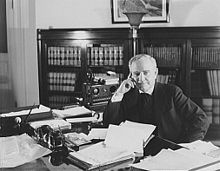John R. McCarl
John Raymond McCarl (November 27, 1879 – August 2, 1940) was an American lawyer and executive secretary of the national Republican Congressional Campaign Committee.
John held part-time jobs during the school year, and in the summers worked for the Chicago, Burlington and Quincy Railroad and local lawyer Webster Morlan.
[5] In 1914, Fletcher Merwin resigned as private secretary to progressive Republican Senator George W. Norris (also from the town of McCook).
He continued to work with the committee in the 1920 presidential election, leaving him well-positioned to seek a job with the incoming administration of Warren G.
[5] Since the final year of the Taft administration (1912), pressure had been building within the Republican Party for legislation which would impose modern financial accounting and budgeting procedures on the federal government.
Worsening national debt due to expenditures required by World War I and a greatly enlarged federal government led to passage of the Budget and Accounting Act of 1921.
[7] This legislation, which President Harding signed into law on June 10, 1921,[8] created the Government Accounting Office (GAO), an independent agency answerable solely to Congress.
[14] Historians Katie Louchheim and Jonathan Dembo note that McCarl had "virtually unlimited power" during his time in office.
[15] He was a decisive leader of the organization, asserted a broad range of powers for himself, and fought strongly to make GAO an impartial and independent agency.
[1] He once voided contracts for the construction of the $12.5 million Arlington Memorial Bridge because they called for the hiring of a general contractor and not specific individuals, as he believed the law required.
[25] In 1922, he established a Bookkeeping Section to sign off on all government contractual expenditures, a Transportation Division to ensure that shipping costs were reasonable, and an Investigations Section to make investigations and inspections, write reports, and make recommendations regarding the operation and financial procedures of the federal government.
He applauded President Roosevelt's decision on June 10, 1933, to issue Executive Order 6166, which created a Division of Disbursement within the Treasury Department and eliminated this office within each agency.
[29] GAO historian Robert Trask says that McCarl was obstinate and harsh,[13] but the Washington Post at the time of his death called him "mild-mannered".

